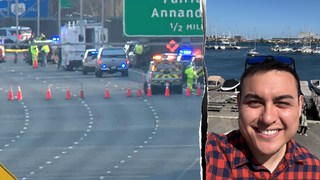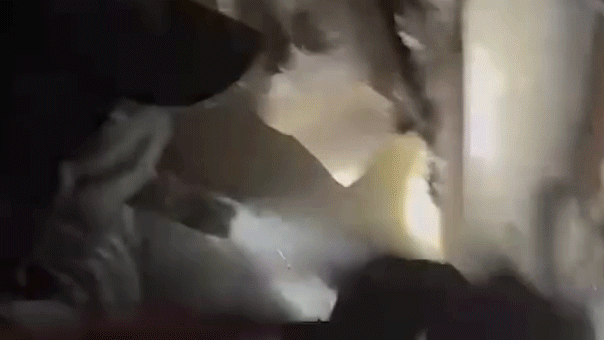Events May 19, Day 30 of a Gulf of Mexico oil spill that began with an explosion and fire April 20 on the drilling rig Deepwater Horizon, owned by Transocean Ltd. and leased by BP PLC, which is in charge of cleanup and containment. The blast killed 11 workers. Since then, oil has been pouring into the Gulf from a blown-out undersea well at a rate of at least 210,000 gallons per day.
THE BLAME GAME
Leading Republicans including John Mica of Florida sought to pin blame for the Gulf of Mexico oil spill on President Barack Obama's administration. During a House Transportation and Infrastructure Committee hearing Wednesday, Mica cited Interior Secretary Ken Salazar's acknowledgment Tuesday that his agency could have more aggressively monitored the offshore drilling industry. Mica said the administration failed to heed warnings about the need for more regulation and issued "a carte blanche" for disaster when it approved drilling for dozens of wells including the Deepwater Horizon site leased by oil giant BP PLC. Committee Chairman James Oberstar, D-Minn., called that inflammatory and wrong. He said the drilling was approved early in the Obama administration, by career officials.
NEXT SHOT
BP said it hopes to begin shooting a mixture known as drilling mud into the blown-out well in the Gulf of Mexico by Sunday. The "top kill" method involves shooting heavy mud into crippled equipment on top of the well, then aiming cement at the well to permanently keep down the oil. Even if it works it could take several weeks to complete.
TAR BALLS
Tar balls that floated ashore in the Florida Keys were not linked to the oil spill, the Coast Guard said Wednesday. That did little to soothe fears the blown-out well gushing a mile underwater could spread damage along the coast from Louisiana to Florida.
WHERE IS IT GOING?
Thousands of barrels of oil are still pouring into open waters every day, and some of it has washed ashore as far east as Alabama. National Oceanic and Atmospheric Administration scientists said a small part of the oil slick from the blown-out well has reached a powerful current that could take it to Florida. They said diluted oil could appear in isolated locations in Florida if persistent winds push the current toward it, but that oil could evaporate before reaching the coast.
CUBA
U.S and Cuban officials are holding "working level" talks on how to respond to the oil spill, a State Department official told The Associated Press. The talks add to signs of concern that strong currents could carry the slick far from the spill's origin off Louisiana, possibly threatening the Florida Keys and pristine white beaches along Cuba's northern coast. The talks mark a rare moment of cooperation between two countries locked in conflict for more than half a century.
HOW MUCH?
Questions remained about just how much oil is spilling from the well. New underwater video released by BP showed oil and gas erupting under pressure in large, dark clouds from its crippled blowout preventer on the ocean floor. The leaks resembled a geyser on land.
SUGGESTIONS
A suggestion box or publicity stunt? BP has received thousands of ideas from the public on how to stop the Gulf of Mexico oil spill, but some inventors are complaining that their efforts are getting ignored. Oil-eating bacteria, bombs and a device that resembles a giant shower curtain are among the 10,000 fixes people have proposed to counter the growing environmental threat. BP is taking a closer look at 700 of the ideas, but has yet to use any of them nearly a month after the deadly explosion that caused the leak.
BP has fielded some 60,000 calls from the public that led to 10,000 tips. About 2,500 people sent in forms spelling out their ideas in greater detail, and BP advanced 700 to the next phase.
MONITORING
Environmental groups are asking the federal government to take over all monitoring and testing related to the Gulf of Mexico oil spill. In remarks prepared for congressional testimony, National Wildlife Federation President Larry Schweiger says BP is keeping too much information from the public.
INSPECTIONS
Senate Democrats are calling for the Obama administration to improve inspections of deepwater oil rigs such as the one that exploded last month in the Gulf of Mexico. The lawmakers said oil companies should pay for the emergency inspections, not taxpayers.
In a letter Wednesday to President Barack Obama, Senate Majority Leader Harry Reid and other Democrats urged immediate and enhanced inspections of all offshore drilling rigs and platforms that could pose a significant environmental threat.
LAWSUITS
More than 100 lawsuits against BP and other companies involved in the vast Gulf of Mexico oil spill should be combined quickly in one federal court to avoid legal chaos and delayed payment of billions of dollars in damages, an attorney said Wednesday. Louisiana lawyer Daniel Becnel wants lawsuits pending in five Gulf Coast states consolidated in federal court in New Orleans or elsewhere in Louisiana, the state hit hardest so far.
TURTLE
Officials say the first sea turtle to be rescued from the Gulf of Mexico oil spill is being cared for in New Orleans. Audubon Aquarium spokeswoman Meghan Calhoun says the endangered Kemp's ridley turtle was found by a biologist looking for oiled animals in the slick. The baby turtle arrived in New Orleans Tuesday night. Calhoun says the turtle has been bathed from the inside of its mouth to the tips of its flippers and stubby tail. It will have several more baths.
PROFESSOR
A St. Louis scientist who was among a select group picked by the Obama administration to pursue solutions to the Gulf of Mexico oil spill has been dropped because of controversial writings on his website. The Energy Department confirmed Wednesday that Washington University physics professor Jonathan Katz was removed because his previous writings had "become a distraction." Katz's website includes articles defending homophobia and questioning the value of diversity efforts. He did not immediately respond to requests for comment.








































